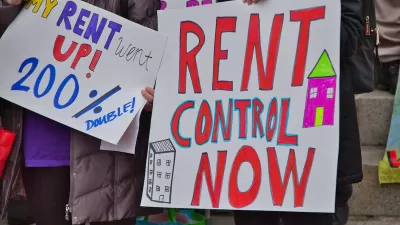The city is pulling back on some provisions in the rent stabilization ordinance passed by voters last fall.

St. Paul, Minnesota’s city council will amend the city’s rent stabilization ordinance after critics complained about the new rules, which would have been the strictest in the nation. According to an article by Bill Lindeke in the Minneapolis Post, “the proposed changes are not bad news for renters because the on-the-ground reality is more complicated than the campaign rhetoric.”
In Lindeke’s view, “the amendments keep the good parts of the ballot ordinance (even adding some new benefits, like just cause eviction protections) while shedding the provisions that have already caused disinvestment in St. Paul housing.”
Lindeke points out that, for example, the 3 percent cap on rent increases included in the original ordinance was subject to a series of exceptions that would let landlords raise rent by as much as 8 percent per year. “The legalistic bait-and-switch between the symbolic and actual rent caps has the added effect of being opaque and confusing, likely to alienate anyone who’s not into computing interest on an amortized investment, using the average rate from Freddie Mac over the last thirty years plus two percent.”
In spite of this, the ordinance has had a chilling effect on new housing construction, with new construction dropping by anywhere from 35 to 75 percent since its implementation. In Lindeke’s opinion, “The obvious solution has always been to pass an exemption for new construction, and the City Council proposal sets a rolling exemption window for twenty years, meaning that apartments in a building built today would enter the city’s rent control system in 2042.”
Lindeke argues that rent control is not an effective tool “in a country predicated on private market housing.” However, “ thanks to the City Council amendments, the end result of this long process is that the city will have a strong rent stabilization policy that focuses on renter stability, a more achievable goal.”
FULL STORY: St. Paul’s rent stabilization amendments will help renters

Planetizen Federal Action Tracker
A weekly monitor of how Trump’s orders and actions are impacting planners and planning in America.

Maui's Vacation Rental Debate Turns Ugly
Verbal attacks, misinformation campaigns and fistfights plague a high-stakes debate to convert thousands of vacation rentals into long-term housing.

Restaurant Patios Were a Pandemic Win — Why Were They so Hard to Keep?
Social distancing requirements and changes in travel patterns prompted cities to pilot new uses for street and sidewalk space. Then it got complicated.

In California Battle of Housing vs. Environment, Housing Just Won
A new state law significantly limits the power of CEQA, an environmental review law that served as a powerful tool for blocking new development.

Boulder Eliminates Parking Minimums Citywide
Officials estimate the cost of building a single underground parking space at up to $100,000.

Orange County, Florida Adopts Largest US “Sprawl Repair” Code
The ‘Orange Code’ seeks to rectify decades of sprawl-inducing, car-oriented development.
Urban Design for Planners 1: Software Tools
This six-course series explores essential urban design concepts using open source software and equips planners with the tools they need to participate fully in the urban design process.
Planning for Universal Design
Learn the tools for implementing Universal Design in planning regulations.
Heyer Gruel & Associates PA
JM Goldson LLC
Custer County Colorado
City of Camden Redevelopment Agency
City of Astoria
Transportation Research & Education Center (TREC) at Portland State University
Jefferson Parish Government
Camden Redevelopment Agency
City of Claremont





























